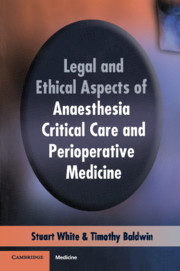Book contents
- Frontmatter
- Contents
- 1 Introduction
- 2 An introduction to the UK legal system
- 3 An introduction to medical ethics
- 4 Rights, and the Human Rights Act, 1998
- 5 Consent
- 6 Negligence
- 7 Confidentiality, and access to medical records
- 8 Abortion
- 9 Products liability
- 10 Research
- 11 Death and organ procurement
- 12 Professional regulation
- 13 Resource allocation
- Appendix: Important legal cases
- Index
3 - An introduction to medical ethics
Published online by Cambridge University Press: 18 August 2009
- Frontmatter
- Contents
- 1 Introduction
- 2 An introduction to the UK legal system
- 3 An introduction to medical ethics
- 4 Rights, and the Human Rights Act, 1998
- 5 Consent
- 6 Negligence
- 7 Confidentiality, and access to medical records
- 8 Abortion
- 9 Products liability
- 10 Research
- 11 Death and organ procurement
- 12 Professional regulation
- 13 Resource allocation
- Appendix: Important legal cases
- Index
Summary
Ethics is a branch of philosophy that is concerned with how the individual may best lead a good life. Simply put, medical ethics is the application of ethics to the practice of medicine – namely how the clinician, or group of clinicians, might provide medical care to the best of their ability and for the maximum benefit of their patients, or society.
What constitutes the ‘good life’ and the practices which enable ‘goodness’ on the part of the individual have been the subject of philosophical debate for several millennia. The basis of Western ethical thinking was founded in the Greek city states from the 5th century BC onwards. At the time, philosophy was a communal affair, and great philosophers were also great orators. Socrates (469–399 BC) declared that morality is not concerned with obeying the law, more that a degree of introspection is needed such that once we know who we are, we will know how to lead a good life. His pupil Plato (428–354 BC), in The Republic, extensively discusses the nature of justice and the nature of the ideal State, his work underpinning much of Western philosophy for the next 2000 years. In turn, Plato's pupil Aristotle (384–322 BC), in the Nichomachean Ethics, introduced a measure of pragmatism to moral thinking, declaring humans to be born with the potential for goodness, but requiring us to discover what it is to be good through the application of common-sense (which is arguably the method by which much of UK common law is still derived).
- Type
- Chapter
- Information
- Publisher: Cambridge University PressPrint publication year: 2004
- 1
- Cited by



